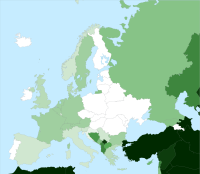
Photo from wikipedia
ABSTRACT Economic activity among Muslim women in the UK remains considerably lower and their unemployment rate significantly higher than among the majority group even after controlling for qualifications and other… Click to show full abstract
ABSTRACT Economic activity among Muslim women in the UK remains considerably lower and their unemployment rate significantly higher than among the majority group even after controlling for qualifications and other individual characteristics. This study utilises two data sets to explore possible factors underlying these differences, such as overseas qualifications, language skills and religiosity. It reveals that while religiosity is negatively associated with labour market participation among British Christian-White women, economic activity among Muslim women are not negatively affected by high religiosity. Furthermore, family structure and the presence of dependent children were among the most important factors explaining the latter’s labour market participation, although these relationships were moderated by qualifications. More women with higher qualifications were economically active even if married and with children, although some of them experienced greater unemployment, probably due to discrimination in recruiting practices and choices and preferences on religious grounds.
Journal Title: Journal of Ethnic and Migration Studies
Year Published: 2017
Link to full text (if available)
Share on Social Media: Sign Up to like & get
recommendations!